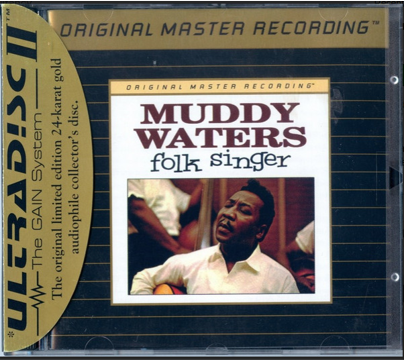Essential Blues Recording
Muddy Waters – Blues Giant And His Team At The Pinnacle Of Their Acoustic Blues Supremacies
Muddy Waters – Folk Singer – Mobile Sound Fidelity Lab UDCD 593
Two weeks in a row we have Muddy Waters recording reviews. There are no excuses ever assigned when essential blues of this import are being considered.
To this blues blogger, there is an obvious significance experienced when trying to pass on the substance of the musical viewpoint revisions that came to be because of the energies of the great bluesman Muddy Waters. Without reservation, Waters’ blues submissions continue to prevail to move and motivate untold numbers of musicians, across many musical boundaries, and his rank in the blues jurisdiction and elsewhere cannot in any way be overstressed.
If one is seeking a categorical conclusive assemblage of Waters’ all-embracing blues impacts, the sprawling collection entitled The Chess Box (MCA CHD3-80002) is indispensable. Throughout that gathering, though the recording companions vary and the actual societal milieus themselves alter, Waters is the uniting link, the stable factor, and the very foundation of what still persists as the very exactness of modern post-war Chicago blues.
The original Folk Singer LP collection was Waters’ second for the Chess label, with the cuts recorded in September, 1963, being released in 1964 as a nine-selection outing. Established in 1977 by Brad Miller, the Mobile Fidelity Sound Lab label was created to bring to market important remastered music for the audiophile market. CD releases on the label began in 1984, with Folk Singer including additional selections, all delivered on the imprint’s Ultra II™ Gold CD technology. Suffice it to say, the sound quality here is startlingly amazing.
This acoustic, pared-down session is idyllic in its barrenness. In fact, the framework employed and the resulting blues is haunting in its astounding simplicity. Waters chairs the proceedings, regal upon his acoustic guitar and authoritative vocals, while Buddy Guy provides oh-so-respectful second guitar expressions, while Willie Dixon’s efforts on upright bass provide supreme low-end ventures, and Clifton James’ restrained drumming perfectly offers the meager percussion required.
The studio acoustics lend to superlative results. Period.
Waters could bray his blues to grand results, and his electric bands remain the textbook models of Chicago blues power. Here, this scaled-back side of Waters’ extraordinary capabilities shine brightly and considerably.
This is not only crucial Muddy Waters blues, but blues itself, in a format that altogether satisfies. It is a living, breathing essay of a blues virtuoso and his committed brethren under the sway of acoustic blues in all the exacting ways.
Essential!
